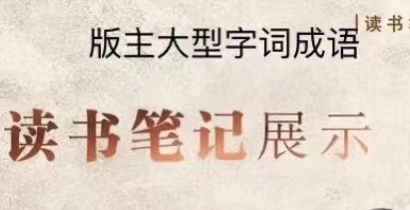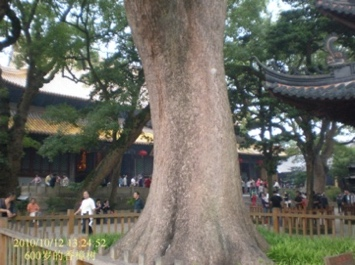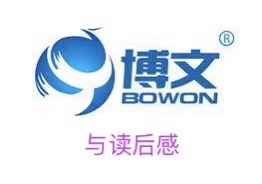During the eight years of working in Mapo, I had a big dream of publishing a book. Whenever I was wandering in the bookstore I was wondering when one of my books could also be on display here. As an intellectual man, I could not estimate how many years it would take me to turn the dream into reality. I often warned of myself that it was my secret which could never be exposed, because it was nearly a daydream. I didn’t want to become a laughingstock that I had bats in the belfry. But I was persisting in my try.
In that period of age, our thought must follow what Zedong Mao had said if you wanted to succeed. You must find a solution to every problem in the works of Mao. I had read a dialogue between Mao and his interpreter Wensheng Tang, saying that there was not a thick Chinese-English dictionary in China. I dreamed of compiling a Chinese-English dictionary according to the instruction of Mao, collecting all kinds of materials by means of my hard work. I had also a feeling that I myself needed such a tool and I could use it myself during the process of gathering what the dictionary wanted.
Before I began to do such a job, I had read series research papers by Zhenxiao Lei, who was born in 1944, one year older than me, entered the Department of Chemistry of Beijing University in 1963, one year earlier than I became a student of Nanjing University. In that era when talented persons began to be summoned he specialized in this topic, becoming a specialist of this subject instead of a chemist, scoring a lucky hitting at the target. He had read extensively ancient and modern books and materials in China and abroad. Skillful in the ancient Chinese, he had written a lot of articles I believed valuable, published on the Chinese Youth Paper. The subject of these series research papers was to summarize the rule of success of the talents at home and abroad, how they developed and what kind of special traits and quality they owned. During the years when I was writing “My Career”, the subject of the lecture on the theory of success was unique, nothing but to make money. The lecturer taught you how to use the lever principle to make your pocket full of notes/money, attracting a lot of male and female fans. Actually, the lecturers themselves first got rich by lecturing. The papers by Zhenxiao Lei referred to a lot of successful persons in variety of fields. He used ancient famous phrases, such as “the straight wood is used as a pillar and the curved one as a plough”, “Since I was born I must be useful” to encourage all kinds of people to try to do their best to become talented persons. I especially liked to read the stories of ordinary people who were born in a poor family and had not any background, but had become successful by his or her own efforts and showed great interest in those scholars who accumulated their knowledge by writing down on cards and achieved great successes. Section 14 already said that in my notebook I had written down large amount of such stories.
Living in the village corner, I didn’t know where to buy cards for my research. The white paper in the school is sufficient, so I cut it into 16k and began to collect and accumulate the English expressions of Chinese characters one by one, with each piece of paper, one Chinese character. If the phrases of a certain character were more than one piece of paper could hold, I used another piece of paper to continue to write on. I bought a lot of clips and clamped these pieces of paper in groups according to the order of the Chinese Pinyin, as if I were compiling a book. I read every English book I could, and wrote down the English expressions of Chinese characters and phrases. After finishing reading all the books I could, I read “Concise English-Chinese Dictionary” page by page, change English-Chinese into Chinese-English and wrote into my script. In the winter we warmed up with coal stove and every evening I was in charge of sealing the stove and every morning I broke the sealing coal, other teachers on duty exempting from their work, because I was the last to leave every evening and the first to get to the office every morning. The coal stove kept the office warm, and I enjoyed taking care of it. The spring, summer and autumn were the very seasons I was busy with “compiling”, which could be described as possessed by the Devil or being infatuated with it. I spent two or three years, writing down every day, high piles of pieces of paper lying on my desk, causing some students and teachers to sing high praise for it, which satisfied my amour-propre in part. But if you looked at it carefully, you would find what I had collected was really a mess-up. Although one piece of paper held only one Chinese character, phrases under it could not be in the alphabetic order of the Chinese Pinyin. I wrote very quickly, my handwriting was poor and the mixture of Chinese and English resulted in chaos, which was far from being published. I knew myself better than anyone else, not willing to give it up, but the collection strength was decreasing gradually, with my hearts suffering the pain attack. It was very hard to decide what to do next. After a period of hesitation, I concluded myself what I had collected was a pile of waste paper and exchanged them for Tofu (bean curd) in the market, going into my belly.
This wishful thinking gave me a profound lesson that I would never act rashly to write a thick book again. I had no choice but to use what Mr. Yunzhong Zhang said to encourage me, “Even if you fail, you can reap some benefit from it”. I had read so many books in English, written down so many words, phrases and sentences, which helped me to keep some of them in my mind and so-so. Poet Qiji Xin of South Song Dynasty had soaring aspiration during his young age, and when he grew old he came back to the countryside, writing a lot of materials to the imperial court on politics and strategy. Later he discovered what he had written was of no use and had to change so many pages of paper for the books, telling him how to grow vegetables and melons. One of his poems said, “Recalling the past, sighing over myself with feeling, the spring wind cannot dye my white hair black. I had to go to the neighbor to change my tens of thousands of word-tactics to defeat the enemy for the book for teaching me how to grow trees.” I changed large amount of pieces of paper with hundreds of thousands of waste words on them for Tofu going into my stomach. seeing the falling flowers, Qiji Xin sighed that the time could not flow back and felt helpless. I was a green man, full of animal spirits. I should have a wide outlook for there was ample time ahead.
However, this wishful idea gave me a painful lesson. Writing a thick book was not an easy job and I could not act rashly and blindly. I encouraged myself again and again with what Mr. Zhang said, “Even if you failed, it is somewhat beneficial to you.” I read so many articles and books, wrote down so many words and expressions and kept some of them in my mind and etc.
Jan. 15 2009 in Melbourne
Proofreading on Feb. 12, 2012 in Chicago
Uploading on Aug. 4, 2023 in Xuzhou









